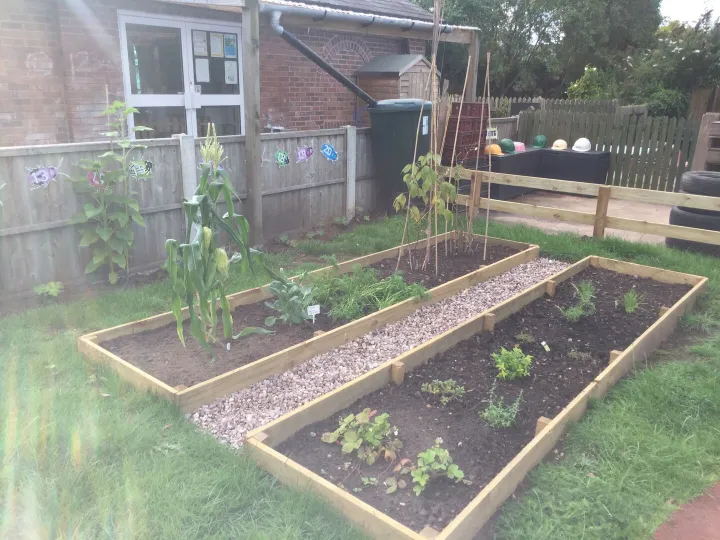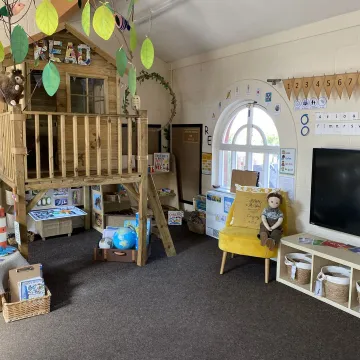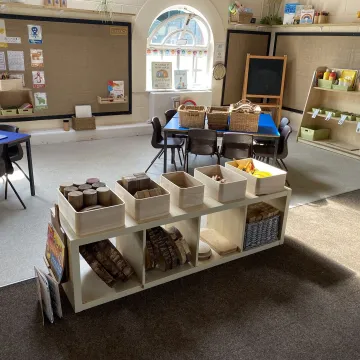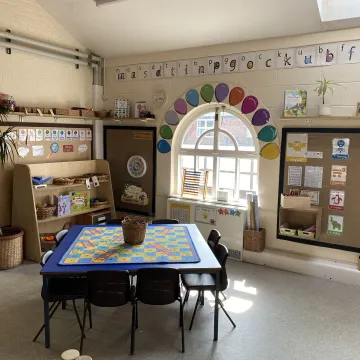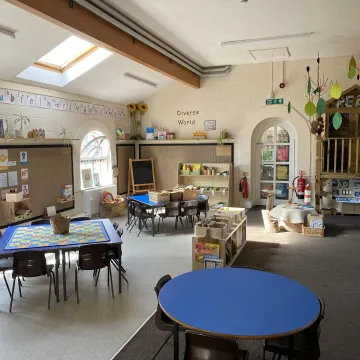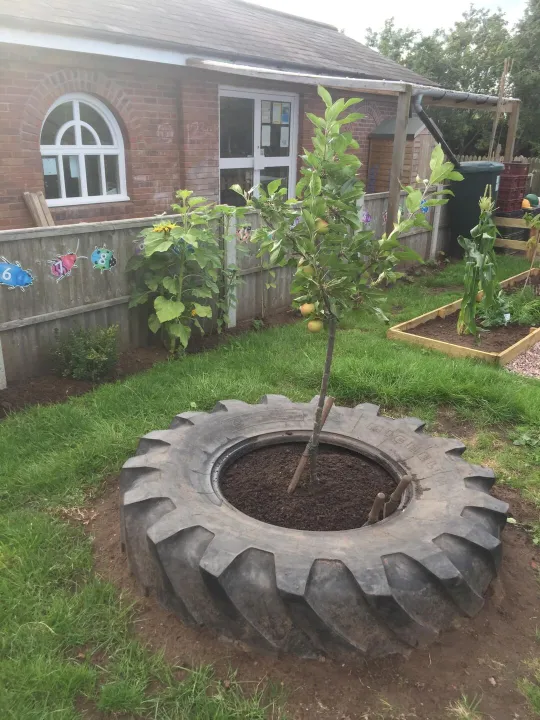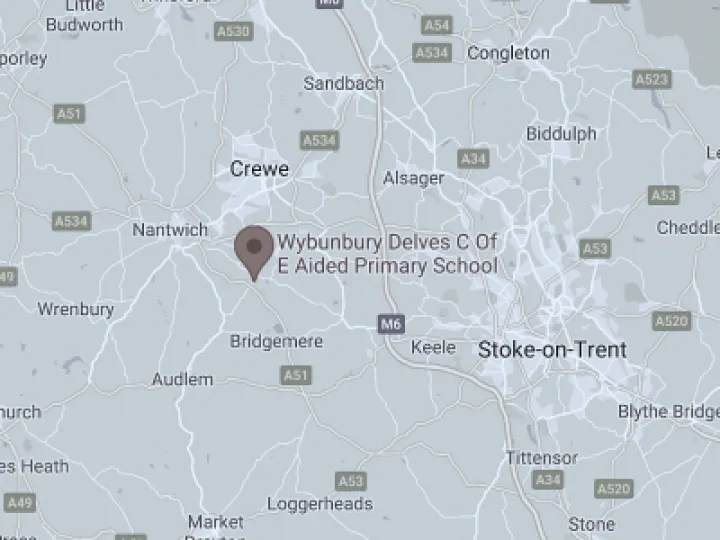Early Years
The Early Years setting at Wybunbury Delves School provides childcare and education for children from the age of 3 to 5 years, consisting of a Preschool room and a Reception Class.
Early Years Ethos
In our Early Years, we are a warm, nurturing Christian family where our youngest children feel safe, valued, and loved by God. We foster an “I can” attitude from the very beginning, helping each child to grow in confidence as they explore, play, and discover the world around them.
We celebrate every child’s Godâ€'given uniqueness, recognising their individual talents, interests, and achievements. Through loving relationships, rich experiences, and joyful learning, we support each child to become the very best they can be — to SHINE in all they do.
We believe that even our smallest learners have limitless potential. With God’s help, we guide them to live, learn, and flourish in His fullness.
Early Years Vision
We nurture an Early Years community where every child experiences wonder, joy, and a love of learning from their very first steps in school. Through play, exploration, and warm relationships, each child is encouraged to shine brightly and grow in God’s love.
Intent
At Wybunbury Delves CE Primary School, our Early Years curriculum ‘lights the spark’ for a lifelong love of learning and of life. Rooted in the spirit of Matthew 5:16 – “Let your light shine”, our provision nurtures confident, curious, and compassionate learners who begin to discover their unique gifts and talents from their very first days in school.
A Love of Learning Through a Literacy Led, Play-rich Curriculum
Our Early Years curriculum is language rich and literacy led, capturing children’s imagination through meaningful, cross curricular experiences. We aim for every child to leave the Foundation Stage as a confident communicator who can express their needs, ideas, and viewpoints with clarity and respect. Through stories, songs, talk, and high quality interactions, children learn to listen attentively, ask thoughtful questions, and engage in purposeful conversation.
We foster a deep love of reading and writing. Children explore texts with enthusiasm, decode with confidence, and write for real purposes, understanding that their words matter and can make a difference.
Strong Foundations in Mathematics
Mathematical understanding is built through playful exploration and intentional teaching. Children develop fluency with number, recognise patterns, and apply their knowledge in practical contexts. We cultivate joy, curiosity, and resilience in mathematics, laying secure foundations for future learning.
Discovery of Individual Gifts and Holistic Development
In line with our whole school vision, we believe every child possesses unique gifts. Our Early Years environment provides rich opportunities for children to explore their interests, develop their strengths, and begin to understand their place in the world.
Through expressive arts, imaginative play, and hands on experiences, children discover their creativity, individuality, and capacity to shine.
We are committed to the holistic development of every child — spiritually, morally, socially, culturally, physically, and academically. Christian values underpin our provision, supporting children to develop empathy, kindness, independence, and emotional literacy.
Ethical Character, Social Responsibility, and Community
Children learn to make good choices, build positive relationships, and understand the impact of their actions. Through shared experiences, celebrations, and community engagement, they begin to develop a sense of responsibility, service, and belonging.
Physical Development and Readiness for Learning
Physical development is central to our curriculum. Children engage in activities that build gross and fine motor skills, coordination, and spatial awareness, supporting their readiness for writing, self-care, and future learning.
Curiosity About the World
Our children develop a growing awareness of people, places, cultures, and environments. Through exploration, investigation, and awe and wonder experiences, they begin to understand the wider world and their role within it.
Growth Mindset and Resilience
We encourage children to embrace challenges, persevere through setbacks, and see mistakes as opportunities to learn. Through reflection, worship, and rich learning experiences, children begin to develop the resilience and confidence needed to let their light shine.
In the Early Years, we lay the foundations for children to become joyful, capable, compassionate learners who are ready to make a positive difference in their community and beyond.
Implementation
Building upon our Early Years intent and inspired by Matthew 5:16, “Let your light shine,” our EYFS implementation is designed to nurture independent, curious, and joyful learners who take an active role in their own learning journey. Through purposeful play, high quality interactions, and rich learning environments, we empower our youngest children to begin discovering their unique gifts and developing the foundations of lifelong learning.
Creating a Culture of Discovery and Empowerment in the Early Years
Diverse, Play-Rich Learning Experiences
We deliver a broad and balanced curriculum that reflects the seven areas of learning, offering children a wide range of experiences that ignite curiosity and imagination. Our provision blends child led exploration with carefully planned adult led learning, ensuring every child can follow their interests while being challenged to deepen their understanding.
Personalised Learning Pathways
We know each child as an individual — their strengths, needs, fascinations, and preferred ways of learning. Through continuous observation and responsive planning, we tailor learning experiences that support and challenge children appropriately, enabling them to make strong progress from their starting points.
Enquiry Led, Hands On Learning
Our Early Years curriculum is rooted in exploration, investigation, and real world experiences. Children learn through meaningful contexts, projects, and provocations that encourage them to ask questions, solve problems, and think critically. Visits, visitors, and outdoor learning enrich their understanding of the world and help them make connections between experiences.
Celebration of Individual Gifts
We create an environment where every child’s strengths are recognised and celebrated. Through expressive arts, imaginative play, storytelling, construction, and role play, children have daily opportunities to showcase their creativity, individuality, and emerging talents.
Embedding Ethical and Moral Development in EYFS
Values Based Education
Christian values underpin every aspect of our Early Years practice. Through modelling, stories, worship, and daily interactions, children learn kindness, patience, self control, and respect. These values shape how they play, communicate, and build relationships.
Developing Emotional Literacy and Moral Reasoning
Circle times, role play, and reflective conversations help children understand their feelings, make good choices, and consider the impact of their actions. They begin to develop empathy, fairness, and a sense of responsibility within their classroom community.
Opportunities for Service and Community Engagement
Even in the Early Years, children take part in simple acts of service — caring for their environment, helping others, and contributing to class and school projects. These experiences lay the foundations for social responsibility and community involvement.
Fostering a Spirit of Independence, Leadership, and Agency
Child Led Initiatives
Children are encouraged to take ownership of their learning — choosing resources, initiating play, and leading their own ideas. Adults support them to develop independence, resilience, and confidence in decision making.
Collaboration and Teamwork
Through shared tasks, construction projects, outdoor challenges, and imaginative play, children learn to work together, negotiate, and solve problems collaboratively.
Cultivating a Stimulating and Supportive Learning Environment
Engaging and Inspiring Teaching
Adults model rich vocabulary, ask open ended questions, and scaffold learning through high quality interactions. Phonics, early writing, and mathematical concepts are taught through engaging, meaningful activities that build strong foundations.
Positive and Inclusive Classroom Culture
Our environment is warm, nurturing, and inclusive. Children feel safe to take risks, make mistakes, and try again. We celebrate effort, perseverance, and curiosity.
Opportunities for Reflection and Growth
Children are supported to reflect on their learning through discussions, photos, floor books, and shared review of their work. They begin to recognise their achievements and set simple goals.
Continuous Improvement and Evaluation in EYFS
Ongoing Assessment and Responsive Planning
We use continuous provision, observations, and targeted assessments to monitor progress and adapt teaching. This ensures learning is always meaningful, challenging, and developmentally appropriate.
Feedback and Collaboration with Families
We work closely with parents to share progress, gather insights, and ensure a joined up approach to each child’s development.
Professional Development
Our Early Years team engages in ongoing training to deepen understanding of child development, pedagogy, and curriculum design, ensuring our practice remains reflective and research informed.
Through this implementation, our Early Years provision empowers children to discover their “light,” develop their potential, and begin their journey as confident, compassionate learners who can make a positive difference in their world.
Impact
The impact of our Early Years curriculum, inspired by Matthew 5:16, “Let your light shine,” is seen in the holistic development of our youngest learners and their readiness to positively influence their world. Through high quality teaching, purposeful play, and carefully planned provision, our children leave the Foundation Stage as confident, capable, and compassionate individuals who are ready to thrive in Year 1 and beyond.
Empowered and Confident Individuals
Help Every Child to Shine
By the end of Reception, our children demonstrate a strong sense of self-belief. They know they can learn, grow, and contribute meaningfully. They communicate clearly, listen attentively, and express their ideas with confidence across a range of contexts. Their resilience is evident in their willingness to persevere, embrace challenge, and view mistakes as opportunities for learning.
Children confidently share their unique talents — whether through art, music, storytelling, construction, or imaginative play — and they transition into Year 1 with the independence, curiosity, and motivation needed for the next stage of their learning journey.
Ethically Grounded and Compassionate Citizens
To become leading lights in our community and our world
Our Christian ethos underpins children’s developing moral compass. They understand right from wrong, show empathy, and demonstrate care for others, creation, and their environment. Through daily routines, collaborative play, and reflective conversations, children learn to manage emotions, build friendships, and make thoughtful choices.
They begin to take responsibility within their classroom community — tidying, helping peers, caring for resources, and contributing to shared projects — laying the foundations for active citizenship and service.
Lifelong Learners and Critical Thinkers
To light the spark for a love of learning
Our children develop a genuine love of learning. They are curious, inquisitive, and eager to explore new ideas through hands on experiences. They think critically as they investigate, problem solve, and make connections across the curriculum.
Literacy Impact
Children make excellent progress in reading and writing. They develop a love of stories, confidently access a range of texts, and apply secure phonics knowledge to read decodable and high frequency words. Their writing is purposeful and valued; they compose phonetically plausible sentences and understand writing as a powerful tool for communication.
Mathematics Impact
Children demonstrate strong number sense, confidently counting beyond 20, subitising, recognising patterns, and exploring number composition. They apply mathematical understanding to everyday situations, showing readiness for the demands of Key Stage 1.
Expressive Arts and Design Impact
Creativity flourishes in the Early Years. Children explore ideas through art, music, dance, drama, and imaginative play. They perform with confidence in cherished school events such as Harvest, Nativity, and Easter, developing originality and self expression.
Physical Development Impact
All children achieve the Early Learning Goal in Physical Development. They are coordinated, spatially aware, and confident in their movements. Fine motor skills are well developed, enabling secure pencil grip and control.
Positive Contributors to Society
To become leading lights in our community and our world
Even in the Early Years, children begin to understand fairness, kindness, and responsibility. They show respect for diversity, appreciate different cultures and beliefs, and demonstrate care for their environment. Through first hand experiences — trips, visitors, cooking, map work, and community engagement — they build the foundations for future learning in Science, History, Geography, and Religious Education. They leave Reception ready to make informed choices, advocate for fairness, and contribute positively to their school and wider community.
A Thriving and Inclusive Early Years Community
Our Early Years environment is characterised by warmth, belonging, and inclusivity. Children, staff, and families feel valued and connected. Diversity is celebrated, and every child is treated with dignity and respect. Collaboration is strong — children work together, support one another, and contribute to shared goals.
Measuring Impact in the Early Years
We evaluate the impact of our EYFS curriculum through:
• Ongoing observations and assessments
• Children’s work and learning journeys
• Self reflection and pupil voice
• Parent feedback and engagement
• Monitoring of progress across all areas of learning
• Transition information shared with Year 1
• Participation in community and service based experiences
Through consistent monitoring and reflection, we ensure our Early Years curriculum empowers every child to “let their light shine” and begin their journey as confident, compassionate, and capable learners.
Quick Links
Contact Us
office@wybunburydelves.co.uk
01270 841302
Wybunbury Delves
Bridge Street
Wybunbury
Nantwich
CW5 7NE

